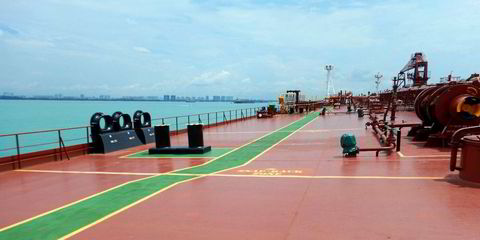London’s standing as the main centre of maritime arbitration remains unchallenged even as the UK bumps along towards an exit from the European Union and emerging dispute resolution forums try to pick up market share, lawyers and arbitrators say.
A report by Holman Fenwick Willan (HFW) concludes that the London Maritime Arbitrators Association (LMAA)'s 1,700 individual maritime arbitrations in 2016 far outnumbered the other centres for handling disputes, and the law firm does not see that changing.
"The numbers show that London remains strongly in favour with the industry and is currently likely to be dealing with over 80% of all maritime arbitrations," says the report, authored by HFW's Craig Neame, George Eddings and Rebecca Warder.
The report was issued shortly before the UK and EU struck a transition deal that will ease the country's exit from the bloc.
Although some law firms in Europe have raised concerns about the impact of Brexit on London's role in arbitration, the HFW lawyers pointed out that the UK's departure from the EU will not affect the international enforceability of LMAA tribunal decisions. Eddings explained that Britain's role as a signatory of the 1958 New York Arbitration Convention is unchanged by Brexit.
It's become really a virtuous circle. There's a cluster of capability, expertise and infrastructure which supports the attractiveness of London
And there is a potential plus to Brexit: companies arbitrating in London might gain the right to seek injunctions in the UK to block attempts to start litigation in the EU.
"London is the pre-eminent centre for arbitration," Eddings told TradeWinds. "Companies from around the world recognise that fact and come to London because of the quality of the service they get."
Neame added: "It's become really a virtuous circle. There's a cluster of capability, expertise and infrastructure which supports the attractiveness of London."
The lawyers, both based in the UK capital, said shipbrokers had reported no change in the use of London arbitration clauses in maritime contracts since the 2016 referendum on leaving the EU.
"Brexit will have no effect at all," said Charles Baker, an arbitrator for the LMAA and the Singapore Chamber of Maritime Arbitration (SCMA). "It might reduce the value of the pound sterling and make the fees of London arbitrators a little bit more reasonable."
Although New York is seen by many as the second-largest arbitration centre, comparable data from its Society of Maritime Arbitrators (SMA) has not been released. But society president Robert Shaw said the past few years had seen a steady case volume in New York, with slight increases.
Shaw explained that the SMA is handling an increasing diversity of cases, beyond its typical focus on chartering disputes.
He told TradeWinds: "We are seeing a greater variety of disputes coming before SMA panels," including more cases involving ship finance, salvage and commodities contracts.
Shaw acknowledged that other arbitration centres are on the rise as more shipowners base their operations in other parts of the world, particularly Asia.
Singapore has been a rising power. Data from the SCMA shows that arbitrators there have handled fewer cases in the wake of the OW Bunker collapse. The chamber had 38 total cases in 2017 compared with 46 in the previous year. But non-OW cases have been on the rise, with 37 handled last year compared with 21 in 2016.
The German Maritime Arbitration Association in Hamburg has seen growth, and Hong Kong and Paris have a sizeable presence.
The HFW report welcomes the LMAA's competition from other arbitration centres.
Neame pointed out that most of the jurisdictions are based on common law, which provides certainty through reliance on precedence.
"It can only be good for business to have certainty," Neame said. "And the wider availability of jurisdictions that are available for the maritime industry to provide them in their own time zone, with the best and trustworthy experts behind them, long-term for the business, it promotes obviously greater economic activity."




